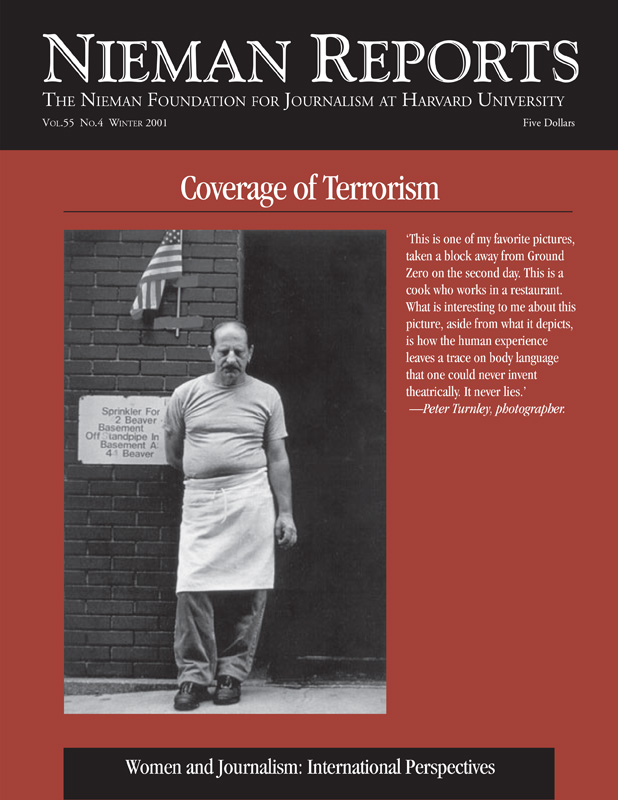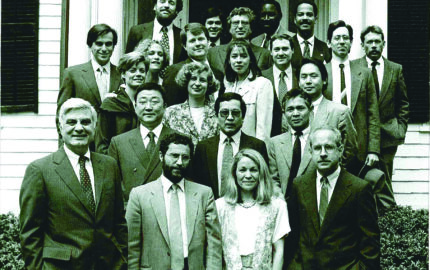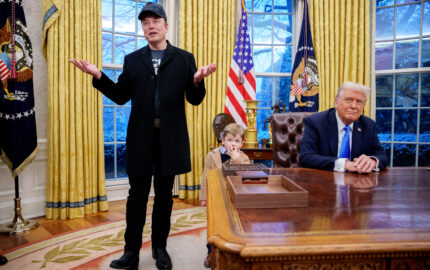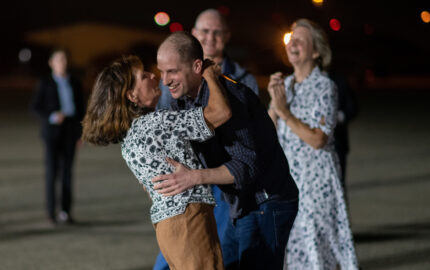When the United States is on a war footing, there is a tendency to set aside many of our traditional checks and balances by a well-intentioned instinct for national unity.
Congress gives the President what he says he needs, with fewer questions asked. At the Pentagon and in media relations offices around the capital, secrecy emerges as a practice, if not a policy. Voices of dissent fall silent. Public debate is avoided. Americans are told to watch what they say.
Essential among many forms of patriotism that emerge in a time of national crisis is the duty of the press to be watchful over the exercise of power. With Congress on the sidelines, there is no forum for a national debate on our military and foreign policy. The press remains the single institution free to independently probe for facts the government wants to shield from American citizens.
During the cold war, this nation paid a heavy price for secrecy and deception used to justify military actions and for a pliant press willing to censor itself or unwilling to challenge the official version of events.
Nieman Reports is devoting much of this issue to an examination of reporting on terrorism, not only to demonstrate that it is an enormously difficult journalistic assignment but also to explore and explain how certain practices of the U.S. government are denying citizens important information.
The administration’s impulse for controlling information is complicated by the nature of combat in Afghanistan. As cities and major regions of that country come under control of the anti-Taliban forces, the western press (though assuming great risk) can move more freely and provide eyewitness accounts and images of how the war is being fought.
This mobility of journalists—aided by advances in technology, such as videophones—has undercut one of the Pentagon’s major strategies for managing how the press report the war: the Department of Defense National Media Pool. Institutionalized pool coverage was used in the Gulf War, effectively limiting independent movement by U.S. journalists. After the war, frustrated representatives of U.S. news organizations tried to negotiate a better arrangement but reluctantly agreed to continue the pool practice in future wars. The early combat in Afghanistan , absent U.S. ground forces, allowed journalists to move with great freedom and greater risk reporting a picture of the war unlike any since Vietnam. The pool was activated in December, igniting controversy in the selection of CNN over the networks to accompany commandos to Tora Bora.
Defense Secretary Donald Rumsfeld says, “Open and independent reporting will be the principal means of coverage of U.S. military operations.” Yet the government continues to seek ways to deny Americans information. It is blocking news media access to satellite images of Afghanistan and neighboring countries, including images that would enable journalists to evaluate reports of bomb damage that killed civilians. Pentagon staffers who discuss military operations with news media have been told that they are breaking federal criminal law.
The administration views this as a public relations war as well as a military war. It has chosen to deny Americans access to what it interprets as Taliban or Al Qaeda propaganda, rather than favoring openness in the belief that American ideas and ideals will prevail. At the start of the war, Voice of America was bullied into canceling a scheduled broadcast of an exclusive interview with Mullah Mohammed Omar, the leader of Afghanistan’s ruling Taliban and a defender of Osama bin Laden. And the administration persuaded television news organizations to engage in self-censorship that deprived the public of a newsworthy statement by Osama bin Laden. Major daily newspapers and wire services wrote stories about the statement, but failed to print a text giving readers a fuller context of his message.
President Bush’s regrettable decision to try accused terrorists in secret before military tribunals would deprive the world of the evidence presented against bin Laden and his aides and risks undermining the legitimacy of any verdict.
When the war against terrorism goes well, the public is more likely to accept official explanations that national security interests justify exceptions to transparency and accountability. Opinion surveys show that the public is content to allow the Pentagon to decide what is news. Thus, the mood of the country seems resigned to the possibility that the search for truth once again is an acceptable casualty in this time of war.
The watchdog role of the press is never more vital than during a national crisis. It is an unpopular role when the approval ratings of the President are so high or when the Pentagon asserts that the national interest requires secrecy.
Monitoring our government at war goes beyond asking technical military questions or probing instances of bad judgment or miscalculation. Yet with the majority and minority in Congress and the nation silent for the most part, the press is obliged to examine the larger issues and build the foundation for debate on fundamental policies that politicians are now so willing to shy away from.
Congress gives the President what he says he needs, with fewer questions asked. At the Pentagon and in media relations offices around the capital, secrecy emerges as a practice, if not a policy. Voices of dissent fall silent. Public debate is avoided. Americans are told to watch what they say.
Essential among many forms of patriotism that emerge in a time of national crisis is the duty of the press to be watchful over the exercise of power. With Congress on the sidelines, there is no forum for a national debate on our military and foreign policy. The press remains the single institution free to independently probe for facts the government wants to shield from American citizens.
During the cold war, this nation paid a heavy price for secrecy and deception used to justify military actions and for a pliant press willing to censor itself or unwilling to challenge the official version of events.
Nieman Reports is devoting much of this issue to an examination of reporting on terrorism, not only to demonstrate that it is an enormously difficult journalistic assignment but also to explore and explain how certain practices of the U.S. government are denying citizens important information.
The administration’s impulse for controlling information is complicated by the nature of combat in Afghanistan. As cities and major regions of that country come under control of the anti-Taliban forces, the western press (though assuming great risk) can move more freely and provide eyewitness accounts and images of how the war is being fought.
This mobility of journalists—aided by advances in technology, such as videophones—has undercut one of the Pentagon’s major strategies for managing how the press report the war: the Department of Defense National Media Pool. Institutionalized pool coverage was used in the Gulf War, effectively limiting independent movement by U.S. journalists. After the war, frustrated representatives of U.S. news organizations tried to negotiate a better arrangement but reluctantly agreed to continue the pool practice in future wars. The early combat in Afghanistan , absent U.S. ground forces, allowed journalists to move with great freedom and greater risk reporting a picture of the war unlike any since Vietnam. The pool was activated in December, igniting controversy in the selection of CNN over the networks to accompany commandos to Tora Bora.
Defense Secretary Donald Rumsfeld says, “Open and independent reporting will be the principal means of coverage of U.S. military operations.” Yet the government continues to seek ways to deny Americans information. It is blocking news media access to satellite images of Afghanistan and neighboring countries, including images that would enable journalists to evaluate reports of bomb damage that killed civilians. Pentagon staffers who discuss military operations with news media have been told that they are breaking federal criminal law.
The administration views this as a public relations war as well as a military war. It has chosen to deny Americans access to what it interprets as Taliban or Al Qaeda propaganda, rather than favoring openness in the belief that American ideas and ideals will prevail. At the start of the war, Voice of America was bullied into canceling a scheduled broadcast of an exclusive interview with Mullah Mohammed Omar, the leader of Afghanistan’s ruling Taliban and a defender of Osama bin Laden. And the administration persuaded television news organizations to engage in self-censorship that deprived the public of a newsworthy statement by Osama bin Laden. Major daily newspapers and wire services wrote stories about the statement, but failed to print a text giving readers a fuller context of his message.
President Bush’s regrettable decision to try accused terrorists in secret before military tribunals would deprive the world of the evidence presented against bin Laden and his aides and risks undermining the legitimacy of any verdict.
When the war against terrorism goes well, the public is more likely to accept official explanations that national security interests justify exceptions to transparency and accountability. Opinion surveys show that the public is content to allow the Pentagon to decide what is news. Thus, the mood of the country seems resigned to the possibility that the search for truth once again is an acceptable casualty in this time of war.
The watchdog role of the press is never more vital than during a national crisis. It is an unpopular role when the approval ratings of the President are so high or when the Pentagon asserts that the national interest requires secrecy.
Monitoring our government at war goes beyond asking technical military questions or probing instances of bad judgment or miscalculation. Yet with the majority and minority in Congress and the nation silent for the most part, the press is obliged to examine the larger issues and build the foundation for debate on fundamental policies that politicians are now so willing to shy away from.



